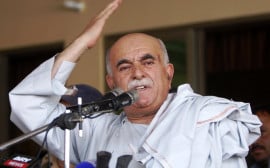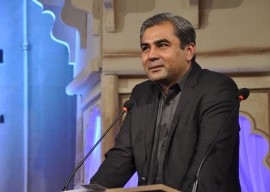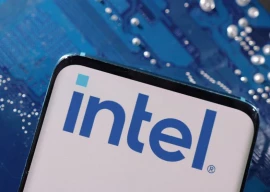
Frere’s dream was realised when the first railway line was opened between Karachi and Kotri, a distance of 169 kilometres, on May 13, 1861. By the 1880’s, several lines had been established and four private companies owned the whole network in northern India. Suspicion of commercialisation, security considerations, and hopes for greater efficiency led the secretary of state for India, to purchase these four companies in 1885 and consolidate them into the North Western Railways (NWR), a nomenclature which would survive the Raj and only get rechristened in 1961 as Pakistan Railways.
In 1947, Pakistan inherited almost the whole of the NWR, with 8,122 km of route track, hundreds of locomotives and a sprawling network of railway schools, hospitals and recreation facilities. The NWR was not just a railway network; it was a holistic organisation which provided for every need of its employees. However, like a number of other institutions we inherited from the British, we have run this once exemplary organisation into the ground. It will not surprise anyone that, according to the 2011 yearbook of Pakistan Railways, the route kilometres have come down to 7,791. No surprise again that the Pakistan Railways yearbook only notes four instances of track extension and improvement since 1947 and obviously does not mention the scores of line closures. Pakistan Railways lost over Rs5.6 billion last year and, at the moment, does not even have the money to pay salaries to its employees.
But let me not depress you more with statistics showing the pitiable state of our railways, where we cannot even afford to run several trains any longer, but suggest a way forward.
The British railways system, like its daughter system in India, was also mainly run by private companies. These private companies ran the railway network till 1948, when the Labour government nationalised the four main railway companies because it wanted the railway to become a public good — available to everyone at cheap prices and run with a consumer focus, rather than a commercial angle. However, by the 1980’s it was clear that the government could not sustain the organisation’s efficiency and low cost, and in order to keep railway relevant in the modern fast-paced world, it had to be left to market forces. Hence, after almost 50 years of government control, British Rail was denationalised and broken up into a number of private run companies who now run the network according to public demand, efficiency and, obviously, profit. Of course this privatisation has meant that certain less profitable and loss-making routes have been closed, but, more often than not, these closures have also reflected falling consumer traffic. Nearly 15 years after the phased privatisation of British Rail, the rail system in the United Kingdom has not collapsed, but remains of a very high standard with improved efficiency, a greater focus on consumer demand and needs, and a rapidly improving and growing network.
In view of the rampant corruption, almost no efficiency and standards, and the daily deterioration of the railway network in Pakistan, we must follow suit, and the government must begin the phased privatisation of Pakistan Railways — this is the only way to keep the railway relevant in Pakistan. Already, a lot freight and passenger traffic has transferred to the more efficient and modern road network and this process will continue unless the railway becomes responsive to market forces and upgrades itself — something which can only happen if it privatises. The railway, in what is Pakistan now, began mainly as a private initiative and expanded rapidly to become the lifeline of domestic travel — its rebirth now also requires the return of private enterprise.
Published in The Express Tribune, December 6th, 2011.
COMMENTS (14)
Comments are moderated and generally will be posted if they are on-topic and not abusive.
For more information, please see our Comments FAQ





























1714024018-0/ModiLara-(1)1714024018-0-270x192.webp)









I think privitization will get rid of biggest problem in pakistan industries Mama Chacha getting jobs and every body else stays behind and same way please privitized the political parties so we can see some neww faces..
Maybe part privatisation, i also think PIA needs to be privatised!
The difference between healthy living and cancer is that while one earns the other burns the body.Of all the means of conveyance man has invented so far railways is the most comfortable and economical system of communication,but for the institution of corruption which knows no bounds a gifted marvel has been rendered useless through plunder of all levels and forms.Author,for the benefit of readers could have done better if he had given the cost comparison of rail/freight,rail/passenger,rail/safety,rail/comfort,rail/economy, with other means of travel/carriage i.e.air,sea and road.Any one remember "sodeshi rail"? by late Shaukat thanwi
Privatization is not the answer to every problem.. Good management is.. Indian Railways is a prime example of this.. By bailing out a pauper every time you dont solve problem but increase problems for ur ownself...
Btw author needs to get his facts correct.. agree with @fahim
RAW+MOSSAD+CIA Agents are working against Pakistan Railways by travelling without tickets & booking their goods by not paying.
Nadir has exploded the myth of privatization ushering in a golden era for British Rail. The author does not need to look very hard for other examples closer to home.
The argument seems to be driven by logic, with no concern for seriously engaging with the contradictions thrown up by the history (one that the author has obviously tried to familiarize himself with, which makes it all the more absurd that he doesn't seriously engage with it) of railways in the region that is now Pakistan. What results can best be described as a simplistic attempt at constructing a polemic in favor of privatization.
For instance, the assertion is made that "the NWR was not just a railway network; it was a holistic organization which provided for every need of its employees" but there is no attempt to link it up with the fact that several of these concessions (in the form of welfare schemes initiated by railways) could only have been extracted from a State employer. This is of course just one problem with the argument, but an important one since it ties up with contemporary struggles of perhaps the most important stakeholders in this debate; the employees of Pakistan Railways. The least that could have been done was to bring up their arguments (much more coherent, logically and empirically) against the privatization of railways.
The case for privatization is shakiest when made in light of empirical evidence, which might explain why the author (being a historian) had to dispense with the historical method and fall back on a highly unsatisfactory economistic framework.
I wish I had investment, I'd purchase Route and Track, from Faisalabad to Lahore
The first Great Indian Railways started in 1853 in Maharastra, from Bombay to Thane.. the word "Pakistan" will not be even created till after 90 years. What nonsense is this that Indian railways started from Karachi??? Unless of couse we agree that from Hindukush to Mizoram its one country India. Are we trying to play with history once again as we have done in all other aspect of our meager existence? some basic facts should be checked.
To be frank, title sounds like a 'Obituary Column'.
Or we could just vote for a less corrupt Govt. next time like every other sane nation in the world
You guys have spent so much of time, effort and resources hating India, you do not have any left for your institutions.
The pathetic and miserable condition of railway is the result of bare mismanagement starting from past two decades to to-date.Mismanagement has played havoc with complete infrastructure of railway built by Britisher.Instead of expansion of the railway and establishing it on the modern footing of advanced technology we have reduced it to ashes.Now a days hustle and bustle of passengers on major railway stations of the country has been finished altogether due to non availability of trains and stations seems as if it were haunted places giving desultory look.Drastic measures are required on war footing to revive the fallen state of once glorious railway of pre-partioned period.
Great article! As a railways enthusiast, I hope PR is revived. A correction though: Sir Henry Frere was instrumental in the establishment of the Scinde Railways, and for this he must be recognized. But, he didn't have a role in the establishment of any railways lines other than the Karachi-Kotri line of 1861.
Lines in Madras, Bombay and Calcutta presidencies were already running by 1859. It was Dalhousie's plan of 1854 to build trunk lines to different regions, that was instrumental to the expansion of the railway network in India which included the lines built in the Northwest, which later were merged to create the North Western Railways. Scinde Railways came about only in 1861 and was one of 4 companies merged into NWR. While his contribution is commendable, particularly for the first line to run in what is now Pakistan, it is hard to justify the title of "father of the railway network in the Indian Empire" for Sir Henry Frere -- "father of the Scinde railway" might perhaps be more appropriate.
Actually, the privitisation of British Rail was a complete failure. A few years later, the government had to nationalize part of the infrastructure, rail lines, train stations back to form National Rail. By European standards the British Rail network is a mess, with high fares and the highest delays in the continent not to mention overcrowding with no hope to equate supply with demand until the 2040s. Privatisation sounds like a rosy possibility, but who is going to buy it? State run Pakistan Railways is going down the drain as its main revenue earner, freight services has nearly disappered as the Pakistan Army has prioritized the NLC for overland freight services to keep NLC is business. Do you think anyone will buy PR if it has to compete with an organization that has the backing of the military? What about PR land holdings that have been enroached upon by the government, military, DHA, cantonments, private property developers? With no capacity to get that land back now, is a private sector investor going to go through the hastle?